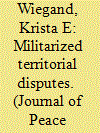| Srl | Item |
| 1 |
ID:
102512


|
|
|
|
|
| Publication |
2011.
|
| Summary/Abstract |
States involved in territorial disputes are more likely initiate militarized interstate disputes to threaten or use force (MIDs) compared to states involved in other types of interstate disputes, when the disputed territory has strategic or ethnic value, and when the opposing states are contiguous, rivals, or have relative power parity. Though useful, these factors are static or rarely change over time, so they cannot explain the timing of an MID in a territorial dispute. It is not clear why a challenger state would threaten or use force at one point in the dispute, but not at another point. This study proposes that challenger states sometimes use MIDs not only to signal resolve to the opposing state in the territorial dispute, but to credibly demonstrate resolve to other adversaries in other disputes - an attempt to transfer reputation for resolve. To tackle the debate about transferability of reputation for resolve, the study empirically analyzes all territorial disputes from 1919 to 1995 and finds support that challenger states are more likely to initiate territorial MIDs as costly signals of resolve and credibility around the same time as another MID with a different adversary. Further analysis indicates that in terms of intensity level, challenger states are more likely to use threats, displays of force, or low intensity uses of force when initiating an MID to signal resolve to other states.
|
|
|
|
|
|
|
|
|
|
|
|
|
|
|
|
| 2 |
ID:
183694


|
|
|
|
|
| Summary/Abstract |
States signal their intentions to domestic and foreign audiences but are not always believed. Why do people believe some state signals but not others? Using a survey experiment on a representative sample of the US public, this study finds that individuals have a negativity bias when assessing the credibility of state signals. They take other states’ aggressive actions as evidence of deep hostility but are skeptical of the credibility of conciliatory gestures. The experimental result shows that the mobilization of a small proportion of an army is perceived credible enough as an aggressive action, while the removal of even a large proportion is not perceived as conciliatory. The psychological mechanism found here is a strong foundation for theorizing about how individuals process information embedded in state signals and can improve our understanding of signaling.
|
|
|
|
|
|
|
|
|
|
|
|
|
|
|
|